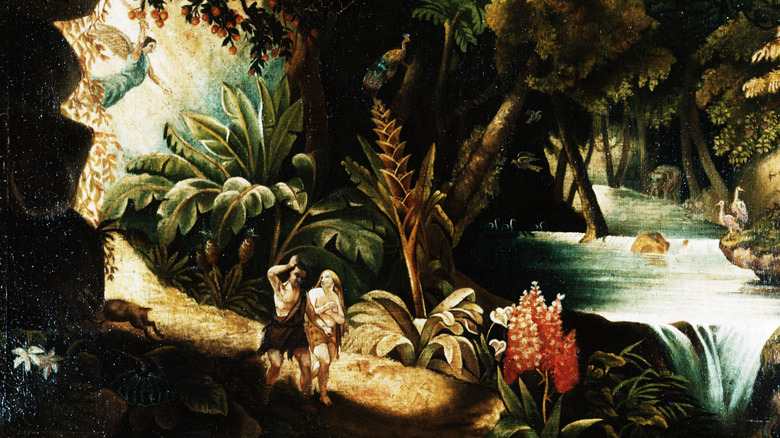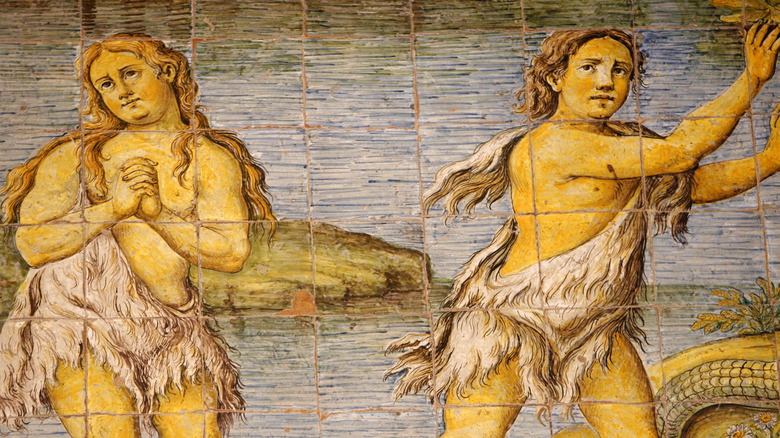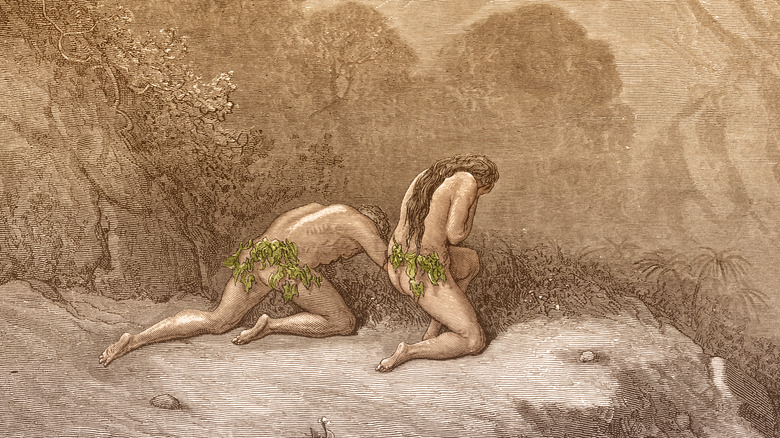What Happened To Adam And Eve After The Garden Of Eden?
There are a number of misconceptions in what we might call the "pop culture" account of Adam and Eve. Genesis never says that the forbidden fruit was an apple, for instance, and the serpent who tempts Eve isn't the devil. Still, the pop culture account gets the broad strokes right: God creates Adam, and then Eve; they live in the Garden of Eden until the serpent tempts them to eat from the forbidden fruit; and God banishes them from the garden when their sin is discovered.
The aftermath of Adam and Eve's fall from grace is perhaps better known for the consequences it supposedly visited upon all humanity than for anything that happened to the sinners themselves. Christianity traditionally rests the concept of original sin — the state of sinfulness that humans inherit from Adam and Eve's deed. That's not a universally accepted notion even among Christians, and Judaism outright rejects the idea. Genesis itself, while linking the sin of Adam and Eve to various ailments and the human condition, doesn't dwell on any larger implications of damnation and salvation, and it quickly moves on from Adam and Eve to their children.
But before the story shifts to Cain and Abel, Genesis 3 does say that God himself clothed Adam and Eve with skins and that their banishment was in part to keep them from obtaining immortality. Once they were driven out of the Garden of Eden, Adam and Eve had to work the land for sustenance, while cherubs barred the way back to the garden and the tree of life.
Islamic tradition says Adam and Eve were separated after leaving the garden
Genesis moves directly from the fall of Adam and Eve to the tragedy of Cain and Abel. But in the Islamic tradition, there is another wrinkle to the story. Adam and Eve's creation and fall is scattered through several verses of the Quran and varies in some key ways from the Christian tradition. Adam was preordained to leave paradise for mortal Earth, Satan rebelled after being ordered to prostrate to him, Eve went unnamed, and Allah forgave them for their sin after they ate the forbidden fruit.
Though forgiven by Allah and always intended to be stewards of the world, Adam and Eve were still ashamed after their transgression. Later developments within Islam held that, upon their descent from heaven, they separated. Adam supposedly came down to Earth in modern-day Sri Lanka, while Eve landed in Arabia. Two-hundred years later, they reunited near Mount Arafāt, and only then did they have children and begin to populate the world.
They ended their days in agony
The Bible doesn't say much about Adam and Eve after their banishment. Genesis says only that they had another son, Seth, after Abel's death, and that Adam lived to be 930. But there is a Jewish apocryphal text, sometimes called "Life of Adam and Eve" and sometimes the "Apocalypse of Moses," that goes into greater detail on their lives outside the Garden of Eden.
According to the work, the parents were aware of their sons' strife and reacted to it, albeit in a limited fashion. After Seth, they had 60 more children together, 30 sons and 30 daughters. At the end of his life, Adam lay in great pain. He called his sons to him and told them the story of their exile from Eden. His agony was too much for Eve to bear, and she offered to shoulder half the burden of Adam's pain. Instead, Adam sent Eve and Seth to approach the borders of Eden and pray for his relief.
They made the journey, encountering an unspecified beast along the way, and on their arrival at the gates of paradise, the archangel Michael promised them relief from suffering — but only at the end of days. Michael then ordered them back to Adam's side to witness the spectacle of death. Adam castigated Eve for bringing suffering upon them, but Eve rebutted him with her own account of mankind's fall. She watched Adam's soul depart for heaven, and six days later, she died herself.


